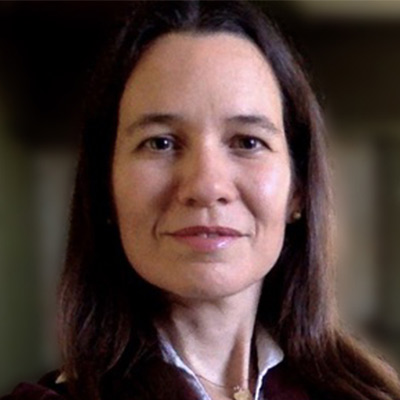Leila Valoura

Assistant Clinical Professor
Gabelli School of Business
Joined Fordham: 2021
General Information:
Hughes Hall, Room 542
441 East Fordham Road
Bronx, New York 10458
Email: [email protected]
-
Leila Valoura, Ed.D., is an assistant clinical professor at the Gabelli School of Business where she teaches communication courses. She is an experienced educator, applied researcher, and consultant with special interest in cross-cultural/intercultural communication, organizational communication, and social responsibility. Professor Valoura brings solid global experience having lived and worked with organizations in Latin America, North America, and Europe. She is fluent in Portuguese, English, and Spanish. Her work with diverse cultures has built a strong intercultural foundation on which she anchors her teaching and scholarly philosophy. Before coming to Fordham, she taught at Baruch College (CUNY) in New York, Charles Drew University of Medicine and Science in Los Angeles, and Bristol Community College in Massachusetts. She has also taught abroad at the Federal University of Rio de Janeiro in Brazil.
Professor Valoura holds a doctoral degree in organizational leadership studies from Northeastern University in Boston, a master’s in applied cultural analysis from Lund University in Sweden in partnership with the University of Copenhagen in Denmark, a master’s in project management from Getulio Vargas Foundation in Brazil, and a bachelor’s in communication studies from the Federal University of Rio de Janeiro in Brazil.
-
- Ed.D.: Organizational Leadership Studies, Northeastern University
- Master’s: Applied Cultural Analysis, Lund University, Sweden (joint program with the University of Copenhagen, Denmark)
- Master’s: Project Management, Getulio Vargas Foundation, Brazil
- Bachelor’s: Communication Studies, Federal University of Rio de Janeiro, Brazil
-
- Cross-Cultural Communication
- Intercultural Communication
- Organizational Communication
- Cultural Analysis
- Social Responsibility
- Applied Research
- Qualitative Research
-
- Valoura, L. (2023). The cross-cultural experience of US expatriates working in Brazil. The International Journal of Organizational Diversity, 23(2), 37-57.
- Merson, M., Valoura, L., Forist, B. E, Hristov, N. I, & Allen, L. C. (2023). Meeting visitor interest to advance conservation: A study from Indiana Dunes National Park, USA. Parks Stewardship Forum, 39(3), 494-506.
- Valoura, L. (2017). Empowering education for cultural diversity. Academy for Cultural Diplomacy, The International Symposia on Cultural Diplomacy. United Nations, New York.
- Valoura, L. & Burton, D. (2014). Downtown New Bedford, Massachusetts: A case of creative placemaking in the United States. In L. Marques, & G. Richards (Eds.), Creative Districts Around the World: Celebrating the 500th Anniversary of Bairro Alto. (pp. 217-224). Breda: NHTV, International Hoger Onderwijs Breda.
- Valoura, L. (2013). Time-space flexibility and work: Analyzing the “anywhere and anytime office” in the entertainment, new media, and arts sector. Culture Unbound: Journal of Current Cultural Research, 5, 339-360. doi:10.3384/cu.2000.1525.135339
- Valoura, L. (2012). Knutpunkten: An ethnographic work at a transportation hub in Sweden. M. Fredriksson (Ed.), Current Issues in European Cultural Studies, 559-568. Norrköping University, Sweden.
- Valoura, L. (2011). [Paulo Freire: The Brazilian educator and creator of the Empowerment notion in its transformative sense] Paulo Freire: O educador brasileiro, autor do termo Empoderamento em seu sentido transformador. In M. Schiavo (Ed.), [Social residency: An innovative program by Comunicarte – social responsibility agency] Residência social: Um programa inovador da Comunicarte - agência de responsabilidade social (pp. 141-155). Rio de Janeiro: Comunicarte.
- Valoura, L. (2011). [Social enterprise: Initiative and innovation to overcome social issues] Empreendedorismo social, iniciativa e inovação para superar as questões sociais. In M. Schiavo (Ed.), [Social residency: An innovative program by Comunicarte – social responsibility agency] Residência social: Um programa inovador da Comunicarte - agência de responsabilidade social (pp. 141-155). Rio de Janeiro: Comunicarte.
- Valoura, L. (2011). [Corporate social responsibility: What it is, its history and main stakeholders] Responsabilidade social corporativa (RSC): O que é, como surge, e quais são os principais públicos de relacionamento. In M. Schiavo (Ed.), [Social residency: An innovative program by Comunicarte – social responsibility agency] Residência social: Um programa inovador da Comunicarte - agência de responsabilidade social (pp. 79-91). Rio de Janeiro: Comunicarte.
- Valoura, L. (2011). [Social technology: Innovative, replicated and participatory solutions for human development] Tecnologia social: Soluções inovadoras, reaplicáveis e participativas para o desenvolvimento humano. In M. Schiavo (Ed.), [Social residency: An innovative program by Comunicarte – social responsibility agency] Residência social: Um programa inovador da Comunicarte - agência de responsabilidade social (pp. 129-141). Rio de Janeiro: Comunicarte.
- Valoura, L. (2011). [Civil society in Marx, Gramsci and in the present] A sociedade civil em Marx, em Gramsci e na atualidade. In M. Schiavo (Ed.), [Social residency: An innovative program by Comunicarte – social responsibility agency] Residência social: Um programa inovador da Comunicarte - agência de responsabilidade social (pp. 21-29). Rio de Janeiro: Comunicarte.
- Valoura, L. (2011). [The process of introducing social innovation: The KAP approach] O processo de introdução de inovações sociais: Abordagem CAP. In M. Schiavo (Ed.), [Social residency: An innovative program by Comunicarte – social responsibility agency] Residência social: Um programa inovador da Comunicarte - agência de responsabilidade social (pp. 107-119). Rio de Janeiro: Comunicarte.
- Homqvist, J.; Valoura, L.; & Paulson, K. (2010). Trash can of worms, a reflection on public recycling during the COP15. In T. Damsholt & O. Löfgren (Eds.), ETN: CO2, The Greening of a Region – ETN: etnologisk skriftserie, 7 (pp. 93-97). Lund: Department of Cultural Sciences, Lund University, Division of Ethnology.